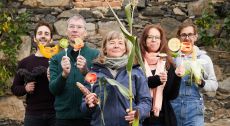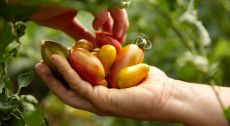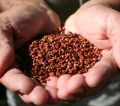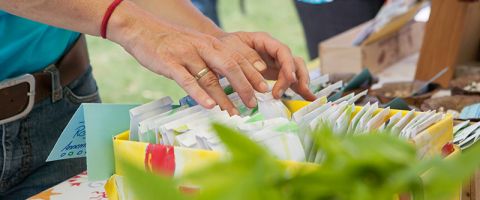EU Seed Law
Colourful diversity, not standardized uniformity!
The rules for crop diversity are being renegotiated - the EU seed law reform
As the problems with the current EU rules for the production and marketing of seeds (in short: EU seed legislation) have become increasingly clear - confusing regulations, burdensome procedures, a drastic loss of plant genetic resources in recent decades (according to the FAO, worldwide minus 75% since 1990) - the EU has initiated a reform process.
In 2014, after a Europe-wide campaign, the attempt to further expand the industrial standard for seeds and to drastically restrict the transfer of seeds between farmers and from farmers to private individuals was defeated. Now, since July 2023, a new reform proposal by the European Commission has been on the table. Within the framework of the well-sounding "Sustainable Use of Natural Resources Package", the already highly complex seed law will become even more impractical and bureaucratic, and the new genetic engineering will be deregulated, thus endangering diversity-friendly and GMO-free conservation work.
The political negotiations in the Agriculture Council and the European Parliament on this law are starting now. ARCHE NOAH is doing its utmost in Brussels to protect diverse seeds and to defend them against the global agro-chemical corporations. Because the agro-chemical and seed corporations want everything to stay the same so that they can further expand their position of power. We want new laws that promote diversity: away from monocultures and seed monopolies, towards regional, diverse seeds that benefit everyone.
This work is supported by Software AG Stiftung as part of the project ‘Gemeinsam Vielfalt befreien' (Together we free diversity)

ARCHE NOAH expert in the European Parliament
27 November 2023: The Upper Austrian economist Magdalena Prieler, ARCHE NOAH expert on seed policy, is campaigning in Brussels for better EU seed legislation. On 27 November, she will be one of three experts answering questions from MEPs on the Agriculture and Environment Committees. To illustrate the serious consequences of the proposed legislation, representatives of European seed initiatives will present MEPs with local bean varieties before the hearing: "Kaiser Friedrich", "Bunte Speckbohne Ljubljana" and many others, along with the warning: "According to the proposed regulation, these seeds may not be sold to farmers".
More information can be found in the press release (DE).
Watch the video of the hearing.
Click here for the petition "Raise your forks - for diversity!"

Europe-wide petition: "Raise our forks for diversity!“
16 November 2023: Together with other organisations of the European seed movement, ARCHE NOAH launches the international petition "Raise our forks for diversity". The demand: The proposal for the new EU seed law must be thoroughly revised, diversity must be the top priority in EU seed law. "The reform is an important decision for the future of our food and agriculture. Let's raise our forks for diversity on our fields and plates and against laws that only serve the agricultural industry," the organisations demand: "Every vote for diversity, every signature counts now!"
This ist the European Commission's proposal.
Find the demands and sign here!

38 organisations from 20 countries call for a diversity-friendly seed law
31 May 2023: ARCHE NOAH has sent an open letter to the European Commission on the upcoming seed marketing reform in the European Union today. The reform is crucial for the seed market, the preservation of cultivated plant diversity and thus also for what will end up on our plates in the coming decades. The European Commission plans to present the proposal for the revision of seed legislation together with a proposal for the regulation of plants produced with new GM technology (e.g. CRISPR/Cas). We demand provisions that enable the preservation of cultivated plant diversity and respect the right to seeds. The restrictive rules that hinder the exchange and sale of seeds and even prohibit them in some EU countries must end!
You can find the open letter here:
Open Letter EN

The seed-marketing-reform must take seriously the climate and biodiversity crisis
8th February 2023: On 7th of June 2023 the EU Commission will publish the draft law for a new EU seed legislation. In the subsequent hearings the rules for the production, exchange and marketing of seeds will be redefined for the decades to come.
In early February 2023 we presented a study in Brussels commissioned by Martin Häusling and Sarah Wiener, Members of European Parliament and representatives of the Group of the Greens/ European Free Alliance. In this study the outdated and restrictive legal system in respect to the marketing of seeds is laid open as well as it is pointed out which changes would be necessary to promote the conservation and use of crop diversity instead of hampering or even inhibiting it. In the ensuing panel discussion, the respective representatives of the EU Commission, from the sector of organic agriculture and of European seed-initiatives expressed their appreciation for the study. The Commission will finalise the draft law in the weeks to come.
Find the study attached in the download section above, or just follow this Link: Study on EU Reform of Seeds Marketing Rules

Seed Law Conference in the European Parliament
22 June 2022: In order to ensure that, despite massive pressure from the industry, crop diversity does not fall by the wayside in the upcoming seed marketing reform, but is allowed to return to our gardens, fields and plates, we held a seed law conference in the EU Parliament. Together with seed savers organisations from many countries, organic farming associations and farmers' organisations, we presented our vision of a seeds marketing legislation that promotes diversity to over 100 interested participants. We also brought ARCHE NOAH seeds with us to the EU Parliamentarians and the EU Commission. Because diversity is there for everyone!

Workshop on EU seed marketing reform
24. January 2022: At the end of January, we organised a 2-day online workshop on EU seed marketing reform. 57 participants from 19 European countries came together - from Portugal to Estonia, from conservationists to farmers and breeders to seed producers. The workshop focused on capacity building, exchange of experiences from different organisations and countries and discussing demands for a diversity friendly legislation. Furthermore, many positive examples how the new rules on organic heterogeneous material will be used in different countries to strengthen agrobiodiversity were presented and discussed.

How to make organic plant breeding mainstream
9th November 2021: Organic plant breeders celebrated their 20th anniversary in Brussels to discuss with stakeholders and policymakers the necessary changes to boost organic plant breeding to support the European Green Deal Strategy and climate change adaptation. The Arche Noah team joint the conference to furthermore discuss the upcoming seed marketing legislation.
To read the full FiBL report click here.

ARCHE NOAH Comment on EU Commission‘s proposal for a new seed marketing law
13. July 2021: in a first round, the EU Commission gathered feedback from stakeholders concerning the presented options for reforming seed law. ARCHE NOAH participated mentioning that space for diversity is critically needed.
Click here to read Arche Noah's statement.

Workshop on the Inception Impact Assessment
Last week the EU Commission published a report for the Inception Impact Assessment of the future EU seed law. The report presents various reform options, discusses possible effects, and asks for feedback.
ARCHE NOAH has therefore organized a Europe-wide workshop with seed initiatives, farming organizations and seed savers on June 21st. The workshop gave us the opportunitiy to discuss the Inception Impact Assessment, exchange ideas and prepare for the consultation process.
Click here for the Inception Impact Assessment.
Click here for the workshop-presentation.

European Parliament resolution - importance of crop diversity recognized
On June 9th the European Parliament emphasizes the importance of bringing nature back onto agricultural land in its new report on the EU biodiversity strategy. The diversity of agricultural ecosystems should be promoted and the local genetic resources should be preserved! In the EU biodiversity strategy, the EU Commission had already considered revising the marketing regulations for traditional crop varieties in order to contribute to their conservation and sustainable use. The registration of seeds should also be made easier for organic agriculture, as well as for traditional and locally adapted varieties. We welcome the fact that the central role of maintaining the diversity of cultivated plants in dealing with the climate and environmental crisis is finally recognized. Words must now be followed by action: We are committed to putting an end to the ongoing bureaucratic restriction of diversity with a diversity-promoting seed law!
Click here for the report of the European Parliament

Commission publishes study on seed marketing legislation!
On April 29th the European Commission published a study on options to reform the seed marketing legislation. The current rules promote industrial, global crops at the expense of locally adapted and produced seeds, and neglect the right of farmers and gardeners to use, exchange and sell their seeds.
We welcome that, in its study, the Commission recognises that the current legislation hinders the conservation and sustainable use of plant genetic resources. However, we are alarmed that the Commission does not rule out the possibility of regulating the exchange of seeds as “marketing”. The right to free exchange of seeds, which is anchored in both international and Austrian law, must remain.
Click here for the study!

Upcoming reform of the EU seed law
In November 2019 the Council of Minister requested the European Commission to carry out a study on options to update the existing legislation on the production and marketing of seeds and other plant reproductive material. The Commission is expected to publish the study in April 2021.
In advance of the study’s publication, 36 organisations from across Europe submitted a joint letter to the European Commission calling for laws that promote, rather rather than discriminate against, the diversity of cultivated plants, and respects the right to seeds anchored in international law.
Click here for the paper
Withdrawal of the EU seed regulation
In February 2015 the European Commission formally withdrew thedraft seed marketing regulation, one year after the European Parliament rejected it. Following this decision, a coalition of NGOs, farmers' associations, and seed savers called on the European Commission to grasp a historic opportunity to conduct an ambitious reform of the EU PRM marketing law, ensuring that it is effectively “fit for purpose” and responds to all connected cross-cutting issues. Read the Call.
Industrial crops by law?
On May 6, 2013 the draft for a new EU seed regulation was launched despite huge public protest. If the new EU seed regulation had been adopted, it would have meant huge administrative hurdles and strong biological limitations. It would have threatened local varieties, ignored the costumers' freedom of choice and forced the interests of the agribusiness. The seed regulation was tailored to serve corporate interests and restricted non industrial plants to tiny and bureaucratic niches. The message was clear: Diversity and farmers’ seeds must be an exception; industrial crops must be the rule.
Gardeners, farmers and growers exchange their seeds because of their interest in old, rare or particular varieties of vegetables and crops. Some seed swaps and seed exchange would have become illegal with the now rejected seed regulation. It was planned that growers who want to pass on their own seeds or other propagating material would have to register as “operators”. Also, the plants would have to undergo "registration". These tests had been designed for industrial varieties; most old and rare varieties are not able to fulfil the registration criteria for biological reasons.
















